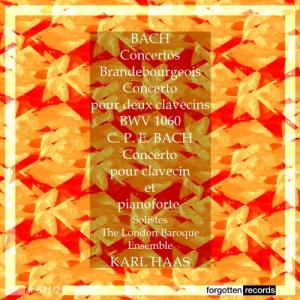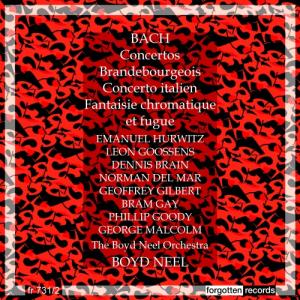 |
 |
| 
|
Johann Sebastian BACH
(1685-1750)
Brandenburg Concertos BWV 1046-1051(1708-21) [113:05]
Concerto for two harpsichords and strings in C minor, BWV 1060 [16:19]
¹
Carl Philipp Emanuel BACH (1714-1788)
Concerto for Harpsichord, Fortepiano and orchestra in E flat H.479
(Wq 47) (1788) [17:50] ²
 Lionel Salter and Charles Spinks (harpsichords) ¹
Lionel Salter and Charles Spinks (harpsichords) ¹
George Malcolm (harpsichord) and Lionel Salter (piano) ²
London Baroque Ensemble/Karl Haas
rec. 1952, London (Brandenburg Concertos), October 1952 (Concerto
for two harpsichords) and March 1953 (CPE Bach Concerto)
 FORGOTTEN RECORDS FR 671-72 [67:52 + 79:09]
FORGOTTEN RECORDS FR 671-72 [67:52 + 79:09]
|

|
Johann Sebastian BACH
(1685-1750)
Brandenburg Concertos BWV 1046-1051(1708-21) [100:20]
Italian Concerto in F, BWV 971 [12:55]¹
Chromatic fantasia and fugue in D minor BWV 903 (c.1720 rev c.1730)
[12:15]¹
 Boyd
Neel Orchestra/Boyd Neel Boyd
Neel Orchestra/Boyd Neel
George Malcolm (harpsichord) ¹
rec. November 1954, London (Italian Concerto and Fantasia) and July
1956, London (Brandenburg Concertos)
 FORGOTTEN RECORDS FR 731-32 [61:23 + 64:09]
FORGOTTEN RECORDS FR 731-32 [61:23 + 64:09]
|
| |
The 1950s was a decade of feast for collectors of the Brandenburg
Concertos. There were performances to suit most tastes, ranging
from Klemperer on Vox via Edwin Fischer, Casals in Prades, Haarth
in Berlin and thence to Münchinger in Stuttgart. There
were many others; not to mention the established pre-war 78
classics by Cortot and Busch.
The two sets under review were part of that LP focus on the
concertos and both came from well respected groups, one of longer
vintage than the other. The more youthful group was the London
Baroque Ensemble directed here by Karl Haas in 1952. This conductor
seldom put a foot wrong in the studio, as opposed to some conductors
of the time who seldom put a foot right in the studio. Here,
alas, Haas met his Waterloo.
The recordings seem to have been made in both London and Paris
by an Anglo-French band. I don’t have chapter and verse
on this but I’m sure this must have contributed to the
failure, as this wasn’t Haas’s regular group. But
what a group it was. You’d be forgiven for thinking things
would be fine with a band led by the dashing British fiddler
Jean Pougnet. Some of the other members of the violin section
include Thomas Carter, Georges Tessier, Pierre Nerini and Marcel
Benedetti. Emanuel Hurwitz plays the ‘piccolo violin’
in the First Concerto. The violas are led by Frederick Riddle,
the cellos by Anthony Pini. Terence McDonagh plays principal
oboe, Richard Adeney the flute, Roy Watson is the principal
bass player, Ian Beers plays horn and the splendid Robert Veyron-Lacroix
is harpsichordist. In Concertos Nos. 2 and 4 the composition
of the group differs, and these were the London-based recordings
where Joseph Chadwick was one of the fiddlers, James Whitehead
the principal cello, and Lionel Salter, better known perhaps
as writer and critic, the harpsichordist.
What a disappointment, and what a trudge. The solo playing is
largely assured, though hardly inflected with sufficient incision.
The finale of the First Concerto is subject to so desperately
slow a tempo that one fears the notes want to curl up and die
of their own accord. Where’s the Polacca? What was Haas
thinking of? Maybe he was trying to corral the disparate and
unfamiliar players to ensure some ensemble precision. Even so.
The Second and Fourth concertos sound lighter, generally speaking,
and put into the shade the trudging, galumphing Third Concerto.
It’s hard to believe such a deadening sense of rhythmic
inertia could be countenanced after the Busch ensemble’s
1930s recording. Much of the performances have the dreaded Bach
knitting machine approach, which is surprising given Haas’s
presence, but the ultimate in train crashes is the slow movement
of No.5 where three otherwise excellent musicians, Pougnet,
Adeney and especially Veyron-Lacroix limp their way through,
without expression, as if they’d never before met each
other or indeed rehearsed.
There are two fillers. Salter and Charles Spinks join the ensemble
for the Concerto for two harpsichords: again the orchestral
sound is quite saturated, but more akin to the lighter London
recordings of the Brandenburgs. Then Salter and George Malcolm
give a delightful performance of CPE Bach’s Concerto for
harpsichord, piano and orchestra. Here things go much better
and the classical ethos draws from Haas much more stylish, textually
aerated playing.
Four years after Haas, Boyd Neel’s long established orchestra
set down its own set of the six concertos on LP. Hurwitz was
the principal violin, and the elite of the profession occupied
the other chairs: Leon Goossens, Dennis Brain, flautist Geoffrey
Gilbert, trumpeter Bram Gay and George Malcolm at the harpsichord.
This is a much happier affair. There is care over articulation,
over strong weight and tone, and over tempi. They are still
on the stately side in many cases but these are pointed with
far more life and zest. Some of the solo contributions are outstanding,
not least the musicians noted above, to whose number we can
add Norman del Mar, playing second horn to Brain, and Philip
Goody as second flute to Gilbert.
To take just one example, that slow movement in No.5 sounds
wholly different here. It’s not just fleeter and more
fluently played, but it sounds wholly sensitive in respect of
its intimacy and the interplay between the three musicians -
Hurwitz, Gilbert and Malcolm. The slow movement of No.6 is genuinely
expressive without any textual muddiness. As a substantial bonus
we hear Malcolm playing the Italian Concerto and the Chromatic
fantasia and fugue in D minor BWV 903 in performances from
1954.
It’s good to have these discs restored so well. Both offer
some great instrumentalists but only one set offers viable performances.
Jonathan Woolf
Masterwork Index: Brandenburg
concertos ~~ Keyboard
concertos
|
|




 All Nimbus reviews
All Nimbus reviews








